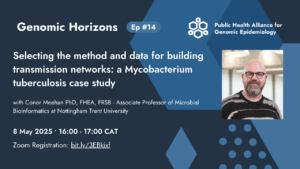Our core team consists of three people: Shadley Wentzel, a Laboratory Systems Administrator; Ziphozakhe Mashologu (Zipho), a core research software engineer; and myself. We keep SANBI infrastructure running and induct new students to use our infrastructure. We also teach and support students on programming languages like Python and a bit of general “Bioinformatics Helpdesk”. We develop new scientific workflows for Mycobacterium. tuberculosis and SARS-CoV-2 analysis. So, our software platforms are focused on public health pathogen-oriented bioinformatics. We also network with and support for bioinformatics in public health in Africa. Key relationships include Africa CDC and various labs on the continent in South Africa, Nigeria, The Gambia, Zambia, DRC and more.
How does your role at SANBI fit in the fight against COVID-19?
I’ve had to learn a lot about viral bioinformatics rather fast and then use that knowledge to support labs in Africa either directly or by connecting them with relevant communities of practice. We develop tools and workflows for analysing SARS-CoV-2 using Galaxy. We have the COMBAT-TB project and Zipho Mashologu and myself have adapted our COMBAT-TB Workbench to analyse SARS-CoV-2. This provides an easy-to-use and easy-to-install bioinformatics workbench for labs needing to analyse samples of this virus.
As one of the three specialized genomics and bioinformatics centres endorsed by Africa CDC and WHO to lead SARS-CoV-2 sequencing in Africa, please describe your support efforts among regional COVID-19 sequencing laboratories.
We have largely been working on the Africa CDC level, and helping them develop the Pathogen Genomics Initiative that supports their SARS-CoV-2 analysis plans. There are nine regional COVID19 sequencing laboratories across Africa and we are involved with three of these on Africa CDC initiatives and other projects – Nigeria CDC, NICD South Africa and also have recently started working with INRB in Democratic Republic of Congo. Our support is generally in terms of answering bioinformatics questions and doing bioinformatics analysis. For example, gap filling; but we are moving towards providing our (open source) Workbench and training for labs in the Africa CDC network and beyond.
What are the achievements/ challenges so far?
A major challenge is the lack of both human and computational resources in African public health settings. We need workforce development to ensure that software and systems engineers and bioinformaticians either work in or with public health labs. And we need to understand the demands bioinformatics places on computing, both in terms of the kinds of computers required and also in terms of how IT is managed. Public health bioinformatics requires managing a relationship between research and routine analysis that is much more fluid than typically experienced by IT divisions.
I think the continental response in terms of standing up sequencing is something to be applauded. We have to go so much further but we’re building from very little. I hope that we never forget the lessons about how important pathogen DNA sequencing is.
Besides COVID-19, what other pathogens of concern are you working on; and why are these important?
Mycobacterium tuberculosis still is a major concern and focus of my work. In a sense TB is multiple overlapping epidemics: many SA TB patients also have HIV, and within the TB epidemic drug resistant TB is a special concern: hard to diagnose correctly, difficult to treat. South Africa has both a high TB burden and also an excellent cohort of TB researchers. We have fewer people working in M. tuberculosis bioinformatics, especially in the public health sector. I hope to spend more time filling gaps in this terrain in future.



